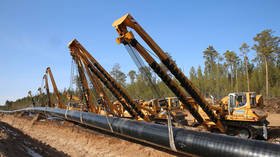The Russian pipeline that could derail China's LNG boom

China’s booming natural gas and liquefied natural gas (LNG) demand is set to cool off, with both demand growth and LNG import growth slowing down from the dizzy growth rates of the past few years.
A major natural gas pipeline designed to ship gas from Russia’s eastern natural gas fields to China could further eat some of the growth in Chinese LNG imports in a few years, when the pipeline starts operations at full capacity, according to an S&P Global Platts analysis.
Earlier this month, Russia’s gas giant Gazprom said that the Power of Siberia pipeline to China is being filled up with gas as scheduled, with operations slated to begin in December.
While the initial volumes of Russian gas shipments to China will be low and unlikely to have a major impact on this coming winter’s LNG market in China, at full capacity in 2023, the pipeline from Russia is set to provide as much as 9.5 percent of China’s expected gas supply, possibly denting LNG import growth, S&P Global Platts has estimated.
“We have many city gas supply projects in the northeast, so the startup of the China-Russia gas pipeline is expected to ease our supply pressure in the winter peak season,” a source at a Chinese city gas supplier told S&P Global Platts, noting that the supplier could mull over reducing imports of LNG when the Russian pipeline gas starts flowing.
Russia will start shipping gas into China at a time when Chinese natural gas and LNG demand growth is slowing down amid weakening economic growth. Still, analysts don’t see China’s gas and LNG demand starting to fall in the coming years and decades.
Demand for natural gas in China will continue to grow in the coming years as Beijing favors increased use of cleaner-burning natural gas to clamp down on stifling pollution levels. Even at its slower pace, LNG import growth could help China outstrip Japan to become the world’s top LNG importer as soon as in 2022. While analysts see no end to LNG import growth in the foreseeable future, experts and the Chinese government itself admit that growth it set to slow over the coming years, with a first such slowdown as early as this year.
The slowing economic growth in China is taking a toll on gas demand growth. The Chinese government has recently admitted that this year’s gas demand growth would slow down from last year’s growth pace—to 10 percent from 17.5-percent growth in 2018. State-run Sinopec Gas Company chimed in with a similar forecast last week, saying that demand for natural gas is forecast to rise by 10 percent this year, at a slower growth rate than in previous years, due to slowing economic growth.
Slowing growth pace, trade disputes undermining investor confidence and industrial output, and China’s pragmatic policy position to manage the pace of coal-to-gas switching inevitably led to a slower rate of Chinese gas demand growth, Gavin Thompson, Vice Chairman, Energy – Asia Pacific at Wood Mackenzie, said earlier this month.
Also on rt.com Energy supernetwork: Putin approves Russia’s new gas pipeline megaproject to China via MongoliaChinese gas demand is set to grow by 9 percent annually this year—“hardly a poor performance, but not matching the 17 percent increase seen in 2018,” Thompson said, but noted that he disagrees with commentators who have started talking about cracks emerging in China’s LNG demand. China will continue with the coal-to-gas switching to reduce air pollution, but it will also look to avoid LNG price spikes seen in the winters of 2017 and 2018, said Thompson, who remains optimistic about China’s natural gas and LNG demand growth in the long term.
Commenting on the impact of more pipeline gas to China, Miaoru Huang, Senior Consulting Manager – China, APAC Gas and LNG at WoodMac, said last month:
“Despite higher flows of pipeline imports, LNG will be crucial to meeting China’s gasification ambitions. LNG is more flexible than piped imports to counter demand and production uncertainty.”
This article was originally published on Oilprice.com















